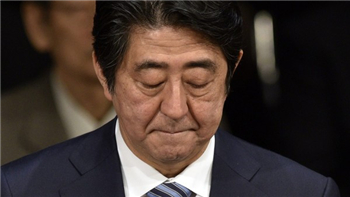(单词翻译:单击)

There is no easy way to translate the phrase “shoot yourself in the foot” into Japanese. That is a pity. Six months ago the Tokyo government privatised the Japan Post Bank — a financial group with more than Y200tn of assets — by selling Y12tn worth of shares to the public.
我们很难把“搬起石头砸自己的脚”译成日文。这令人遗憾。6个月前,日本政府将日本邮政银行(Japan Post Bank)私有化,将价值12万亿日元的股票出售给公众。这家金融集团拥有逾200万亿日元的资产。
The hope was that this would finally tempt ordinary investors — the so-called Mrs Watanabes of Japan — to embrace equity ownership, encouraging households to abandon cash and assume asset risk, boosting growth.
日本政府希望此举将最终吸引普通投资者(所谓的渡边太太(Mrs Watanabes))投资股票,鼓励家家户户放弃现金,愿意承受资产风险,从而推动增长。
That, however, was before the Bank of Japan’s introduction in January of negative interest rates — which this week tipped yields on 10-year Japanese government bonds below zero. This will hit JPB harder than any other institution, since almost half its portfolio is held in such bonds. Unsurprisingly then, its share price plunged more than 20 per cent below the initial public offering level . Instead of teaching Mrs Watanabe the joys of equity risk, the JPB policy has left her burnt.
然而,那是日本央行(Bank of Japan)今年1月推出负利率之前的事情;负利率最近导致日本10年期政府债券收益率降至零以下。这对日本邮政银行的冲击将超过其他任何金融机构,因为该行投资组合中的几乎一半资产是此类债券。难怪该行股价大跌至低于首次公开发行(IPO)发行价逾20%的水平。日本政府对该银行的处置没有让“渡边太太”享受到股市风险的乐趣,反而烧伤了她。
Many outside Japan will be tempted to dismiss this as a local peculiarity. That would be a mistake. The lesson from this saga is that it is not just investors being pushed into an Alice-in-Wonderland financial world by today’s wild central bank monetary experiments. Governments, too, are being tipped into peculiar policy contradictions, raising questions about whether negative rates will do what they are intended to do, in Japan as elsewhere.
日本以外的很多人很容易将这视为个案。这么认为就错了。这个故事带给我们的教训是,被如今疯狂的央行货币实验推入“爱丽丝梦游仙境”般金融世界的不仅仅是投资者。政府也正被带入奇特的政策矛盾,这引发了有关负利率能不能收到预期效果的质疑——在日本以及其他国家。
To understand this, take a look at the mechanics of Japan’s experiment. When the BoJ introduced negative rates, officials argued they would boost growth because the shock would finally force companies and investors to do something productive with their mountains of idle cash or bank deposits.
要理解这点,看一看日本货币政策实验的作用机制吧。当日本央行提出负利率时,官员们辩称,负利率将推动增长,因为这种冲击将最终迫使企业和投资者利用他们闲置的巨额资金或银行存款,做一些富有成效的事情。
That sounds sensible, but since officials also feared that negative bank rates would cause depositors to stuff cash under the mattress, they took a leaf from Switzerland’s book and designed policies to ensure retail accounts are not subject to negative rates. The only deposits with negative rates are those held at the central bank itself by big institutions — about Y10tn of assets.
这听上去合情合理,但官员们还担心,银行负利率将导致储户把钱藏在枕头底下,因此他们借鉴瑞士的经验,从政策设计上确保散户账户不适用负利率。唯一面对负利率的存款是大型金融机构存放在日本央行的存款,资产规模约为10万亿日元。
Now, if that Y10tn pot belonged to companies or banks, there might be a clear transmission mechanism to the “real” economy. But Brian Waterhouse, an analyst at Asia-focused brokerage CLSA, estimates that Y8tn emanates from none other than JPB , which is not allowed to make loans. Of course, if the company responded to negative rates by buying risky Japanese assets, such as equities and bonds, it could still create indirect sources of credit though at present it does not seem to be doing so.
如果这10万亿日元资金属于企业或银行,那就可能会有一个向着“实体”经济的清晰传导机制。但关注亚洲的里昂证券(CLSA)分析师布赖恩•沃特豪斯(Brian Waterhouse)估计,这其中有高达8万亿日元来自日本邮政银行,而该行被禁止发放贷款。当然,如果该行通过买入日本高风险资产(例如股票和债券)对负利率做出回应,它仍能创造间接的信贷来源,尽管目前该行似乎并没有这么做。
Instead, JPB managers, like other asset managers, seem more inclined to put money overseas. In theory, that could provide another type of transmission mechanism: an important, if unstated, reason for the BoJ’s introduction of negative rates was the hope that it would weaken the yen. Sadly even this policy has backfired: in the past month the yen has strengthened by 7 per cent against the dollar, which, in turn, has undermined the credibility of the central bank.
相反,与其他资产管理者一样,日本邮政银行的管理者似乎更倾向于将资金投向海外。理论上,这可能会提供另一种传导机制:日本央行引入负利率的一个重要(但没有明说的)原因是希望此举令日元贬值。遗憾的是,就连这个政策也弄巧成拙:过去一个月,日元兑美元升值7%,这进而破坏了日本央行的可信度。
Maybe this is a temporary setback. And some BoJ officials think there will be other transmission channels. In particular, they hope that the shock of negative rates will force Prime Minister Shinzo Abe to introduce equally radical structural reforms to the corporate world and labour markets. In particular, the BoJ is urging companies to raise wages in order to fight deflation and find uses for spare corporate cash.
或许这是暂时的挫折。日本央行一些官员认为,还会出现其他传导渠道。尤其是,他们希望负利率的冲击将迫使日本首相安倍晋三(Shinzo Abe)在企业界和劳动力市场推行同样激进的结构性改革。尤其是,日本央行正敦促企业提高薪资,以抗击通缩并充分利用企业的闲置资金。
Even this idea seems contradictory. In a world of negative rates, it is hard to see why companies would suddenly feel inspired to raise salaries sharply. Watching government bond yields turn negative has made business leaders more, not less, fearful.
即便是这种想法似乎也是矛盾的。在负利率世界里,很难想象企业会突然觉得受到鼓舞而大幅加薪。看到政府债券收益率变为负值,已经让企业高管变得更担心(而不是放心)了。
Of course, for the incorrigible optimist, it is possible to see a silver lining: as Jesper Koll of Wisdom Tree asset managers points out, the fact that policy is failing might yet force the Abe government to act. Mr Koll expects to see even more radical fiscal measures soon, in the form, for example, of “cash handouts to low-income pensioners” and assistance to mothers. “Helicopter money could become a real possibility,” he says.
当然,不可救药的乐观主义者可能会看到一缕希望之光:正如资产管理公司Wisdom Tree的杰斯珀•科尔(Jesper Koll)所指出的那样,政策失灵的事实仍有可能迫使安倍政府采取行动。科尔预计很快就会出现更多激进的财政举措,例如“向低收入养老金领取者发放现金”以及向母亲提供补助。他表示:“‘直升机撒钱’可能会变成一件真正有可能发生的事情。”
Perhaps so, but without such a gesture from Mr Abe’s team, the sad message is that Japan and its central bank seem stuck. Consider it a lesson in the need for concerted government action.
或许如此,但在安倍团队没有表态的情况下,令人悲哀的信息是,日本和日本央行似乎正陷入僵局。把这视为一个需要政府协调行动的教训吧。
According to Hiroshi Nakaso, deputy BoJ governor, it is a sign that monetary policy alone “is not a panacea” when deflation hits. Either way, global investors should look at JPB and wince. So should poor Mrs Watanabe.
日本央行副行长中曾宏(Hiroshi Nakaso)表示,这表明,在通缩出现时,货币政策本身“不是万能药”。不管怎样,全球投资者应该关注日本邮政银行的案例,然后知难而退。可怜的“渡边太太”也应如此。


